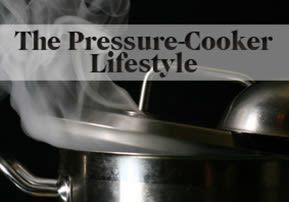
The Pressure-Cooker Lifestyle
The Melitzer Rebbetzen presents us with a new thought-stimulating series that will surely help us grow. What makes us different from our grandparents? Why are we so pressured?

The Pressure-Cooker Lifestyle, Part 1
It’s an amazing thing that in a world that has become so much more developed and advanced than in previous centuries, the peace, calmness and tranquility  we all crave still eludes us. In fact in this modern age people seem to be even more dissatisfied, nervous and agitated than in the past.
we all crave still eludes us. In fact in this modern age people seem to be even more dissatisfied, nervous and agitated than in the past.
 we all crave still eludes us. In fact in this modern age people seem to be even more dissatisfied, nervous and agitated than in the past.
we all crave still eludes us. In fact in this modern age people seem to be even more dissatisfied, nervous and agitated than in the past.Not all that long ago, meaning in my grandmother’s time, in the little village where she lived the water for daily use was still being drawn from the well; running water from a tap was only available in the big cities. My great-aunt Feige, my grandmother’s sister, who was an old lady when I got married and originally met her, told me that when she went to the big city for the first time and saw "water coming out of the wall" she was absolutely astonished. "Just like the time that Moshe Rabbenu struck the rock in the desert and water came gushing out" was how she described this "amazing phenomenon".
And when I told her that I had come to Eretz Yisroel by plane she looked at me in wonder and said "You really flew up into the heavens? Weren’t you frightened that you would fall down"? To which I replied in my youthful arrogance, "Flying in a plane is so common today that no-one even thinks about these things".
When I asked her what she thought of flying, she said that she was unable to understand how a machine was able to get off the ground and fly because it wasn’t like a bird that Hashem has created with the capabilities of flying, but if I had flown (and remained alive to tell the tale) she understood that it was possible. It reminded her, she said, of Hashem’s promise to the Yidden that He would "lift them up on the wings of an eagle."
My great-aunt was a very little, old lady who, although she only came up to my shoulders and was very old-fashioned (in my young eyes), she was very sharp. She had all her wits about her and when she looked at you with those little, sharp eyes of hers you felt she could see right through all your pretensions. She had an opinion on anything and everything and although she was busy all day davenning and saying tehillim and hardly stepped out of her front door, she was right on the ball with her observations. I was fascinated by her sharpness and intelligence, even though she had lived in Meah Shearim from when she had arrived in Eretz Yisroel.
It was absolutely fascinating how my great-aunt associated everything in life with the Torah and it’s a shame I didn’t ask her what she had thought of the car or train when she first saw them, because if tap water had been a new invention for her, cars and trains had surely been. I wonder where she would have found a reference to them in the Torah.
Can you imagine that? I knew someone for whom tap water was an "invention"?!
When my grandmother was young women labored from morning to night washing the clothes and linens by hand in a washtub. Washday itself was a major project that consumed an enormous amount of time and energy.
And there were no ready-to-cook chickens on the butchers’ shelves, or ready-made bread in the grocery store then. If you wanted to eat a fleishige meal you had to go to the market to buy a chicken, then run to the shochet to slaughter it. After that you had to "flick" it (remove all the feathers), a tedious and time-consuming job in itself (although the feathers were saved to be sown into quilts for the winter), clean it and kasher it, and ONLY THEN could you cook it. – ¾ of a days work for a piece of cooked chicken.
Do we even think about how hard life was then and how fortunate we are today? In this day and age we’ve got all sorts of machines to help us; washing machines, dryers, cookers and ovens, microwaves, fridges and freezers and central heating – to name but a few of our absolute necessities that in those days had not even been invented. The list is endless and mind-boggling if you stop to think about it for a minute.
And don’t forget instant lighting at the flick of a switch; even that wasn’t available in the shtetlech. And what about our toilets? Those too are a "modern invention".
I myself am also part of history I used to joke with my children, because I lived before the time of penicillin and antibiotics; they were a "new invention" for me too. I still remember the first time our general doctor came to our home and gave a dose of penicillin to my youngest sister who was delirious with a raging fever, and how within half an hour her temperature had returned to normal and she was talking to us coherently. How excited we were by the new "wonder-drug" that was going to knock-out all illnesses. How times have changed though because antibiotics, through misuse or overuse, are unfortunately not the answer to all our "ills".
I once went to visit the Science Museum in London with my family and whilst I was there I went up to the History Section because I had heard that there was a display of kitchens in former times.
And lo and behold! There was my mother’s washing machine, hand-wringer and all, amongst a few other kitchen gadgets that are no more than fond memories. My children were dumb-founded by my excitement at seeing those "old-fashioned gadgets" and asked me how we had managed in the "old days".
But even with all our advances we don’t seem to be any happier and better off than our grandmothers who had none of these things. We lead very stressful, pressured lifestyles in stark contrast to our grandmothers, who although they were busy all day lived life at a much slower pace.
Had our grandmothers and great-grandmothers been able to foresee the time when women would have all the modern conveniences that are now available, they would have wistfully said that with all these labor-saving devices a woman can live a comfortable and easy life; with so many machines to help her she doesn’t have to constantly be under pressure to prepare every morsel of food from scratch or work so hard on the family laundry. She can have time to spend with her family and do many mitzvos and ma’asim tovim.
Yet we see the exact opposite today. We, who do have all these labor-saving devices and more, are actually a very pressured generation rushing through our daily lives and constantly on the run.
Why is it then that even with all those devices the pressure in our lives seems to have actually increased tremendously, with the result that this generation has many "modern" illnesses that were unknown to our grandmothers, such as nervous breakdowns and emotional disturbances to name but two.
The main reason for this accelerated pressure is that we have what our grandmothers would have considered an extremely high standard of living. What we regard as absolute and utter necessities today would have been in our grandmothers’ times’ outrageous and unheard-of luxuries.
Who, in those times, would have dreamt of having their own equivalent of the car, a personal horse and cart always available when needed? It would have cost a fortune. Yet who today doesn’t own a car which does cost a fortune to buy and another one to run; how can one even live without one? And for those of us who still don’t have a car what are car services for, the cost of which is also not negligible.
And how about our homes, and all that we own in it? I’m sure our grandmothers’ homes were not built with all the conveniences we have; their whole home probably fitted into one of our rooms. Not only were there no beautiful kitchens (and certainly not two sinks) or tile floors, but they also didn’t have all the cupboards and their contents that we possess.
It’s actually a good thing that we do have our appliances because they simply enable us to keep up with all the work we have. (Had our grandmothers led the kind of life we lead they would also never have managed without all the appliances we have).
What was yesterday unheard of luxuries, that only the Rothschild’s of that time dreamt of possessing, are today the barest necessities without which one is considered extremely poor.
Naturally with the abundance available today none of us would dream of returning to the kind of lives our grandmothers lived, but there’s a catch to all this – it has to be paid for!
And the price we pay for this abundance is time and money – a lot of money!!
Time, because to manage all that we own takes time and energy. To clean our homes and keep track of what we possess, and take care of our families in between, is a full-time job for us women.
And to pay for all this is a full time job for our husbands. Whether it’s buying what we need, or the upkeep of what we possess our husbands are the one’s who’re paying the price. More than that; if our husbands can’t earn enough we women are also tied to the treadmill of paying for our lifestyle.
And that, more than anything, is why we are so pressurized and rushed in this day and age.
Unfortunately, our bodies were not created to live at such a frenetic pace; it’s not healthy for our nervous systems which are in a constant state of agitation. We’re living on the run and rushing towards the next item on our agenda of commitments and that takes its toll of us. We’re in a constant state of heightened alert with hardly any time to relax, and the result of all this is the "modern" illness of nervous tension…
To be continued.











Tell us what you think!
Thank you for your comment!
It will be published after approval by the Editor.